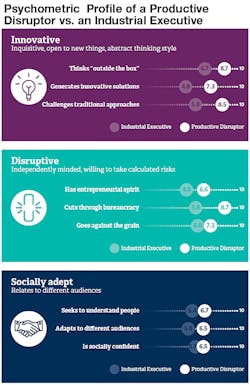Talent Strategies for Industrial Digital Transformation
We are in the middle of a fundamental transformation in today’s industrial world. The industrial Internet is bringing both evolutionary and revolutionary changes, and whilst industrial companies are at various stages of this transformation, they all need to rethink their related talent strategies.
Transforming an organization from a machinery-led to a software-and-services-led company is not easy. In our conversations with top executives from industrial manufacturing companies around the world, many said they need to conquer the following five challenges: (1) reimagining current business models in the face of disruption, (2) confronting new competitors, (3) upgrading the organizational culture to cultivate innovation, (4) investigating new forms of leadership that young talent responds to better, and finally, (5) bringing software and services up to required levels of speed and agility.
A successful digital transformation leader is a distinct type of individual with a particular set of skills and qualities. These leaders must be “productive disruptors” who go against the grain and can imagine and shape the future industrial landscape defined by software and services. Moreover, they must be highly socially adept and be able to take the wider organization with them on this journey.
Russell Reynolds Associates examined how 178 industrial executives stacked up against the psychometric profile of a productive disruptor (see “Psychometric profile of a productive disruptor vs. an industrial executive”) and found that industrial leaders are, on average, less likely to approach the business in unconventional ways and are less open to taking risks and driving change. However, some industrial executives do exhibit some of these traits. It is in the organization’s best interest to identify these individuals and assign them to roles in the digital transformation. But most industrial companies will need to look outside their own sector to identify pivotal productive disruptors who will help lead them into the next era.
1. Find and retain your digital leaders
Companies should look for leaders with digital know-how and vision. As Paul Stein, chief scientific officer of Rolls-Royce, told us, “Leaders need to be at least ‘digital migrants,’ if not ‘digital natives.’” Identify and assess – through psychometric measurements and interviews – who is best suited to lead and champion change and who is best suited to execute. Digital leaders need to be empowered to build new teams and lead change across the entire organization.
Digital talent is in high demand across the industrial landscape, and there is a scarce pool of qualified leaders. Companies should benchmark their compensation structures and opportunities for advancement against the sectors they are competing with to bring in and retain top digital talent.
2. Lead from the top
Buy-in and support from the top of the organization are crucial. The CEO should partner actively with the most senior digital leader and take charge of important decisions and changes pertaining to the company’s digital strategy. The CEO must also be a passionate internal cheerleader for digital and must communicate this throughout the organization.
Digital know-how is also necessary on the board. Having at least one director with a digital background is important in order to build a bridge for other board members, according to Klöckner’s CEO Gisbert Rühl. This board member can also help ensure that digital remains at the top of the company’s agenda and can help secure broader support for rethinking old mind-sets and taking new approaches to ROI calculations.
3. Transform your culture
Without the right cultural prerequisites, it will be almost impossible for digital teams to drive significant change in the organization. When pursuing their digital agenda, company leadership should pay equal attention to cultivating the attitudes, behaviors, and mechanisms that permit innovation to thrive – one being a “fail fast” attitude that encourages experimentation and innovation. Even the best digital leaders and the most aggressive digital strategy can be thwarted by old attitudes and values.
Having the right talent in place at the top of the organization is crucial not only for internal transformation, but also for building the right relationships externally. One strategy for classic manufacturers looking to learn from software companies is to build partnerships and “co-create” with them. Sanjeev Addala, chief digital officer of GE Renewable Energy, commented that while many companies are building “bigger or better products,” they should go one step further and “open up and work across industries to ensure their survival.”
The Way Forward
In order to successfully transform into technology-driven industrial companies of the future, today’s industrial companies should follow the three talent recommendations outlined above. Skilled digital transformation leaders are the engine powering meaningful digital change. Buy-in from the CEO and board, along with increased digital literacy at the top of the organization, are key to ensuring that major change can actually happen. Finally, a modernized company culture will create an environment that accepts and encourages innovation.
Jens-Thomas Pietralla is head of executive search firm Russell Reynolds Associates’ Industrial Goods practice, and David Finke is head of Russell Reynolds Associates’ Technology sector. Russell Reynolds Associates is a global executive search firm with 46 offices worldwide. To read more about their views on industrial Internet, see “The Hunt for Digital Leaders: A Talent Perspective on Navigating the Industrial Internet Transformation” (2016).

